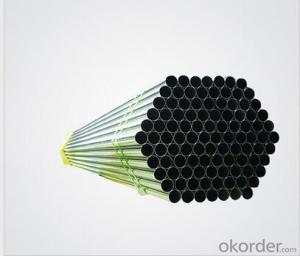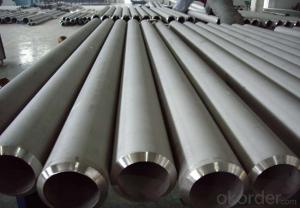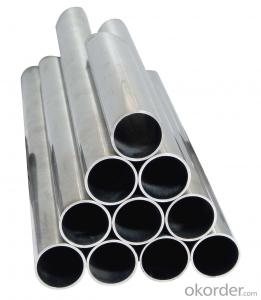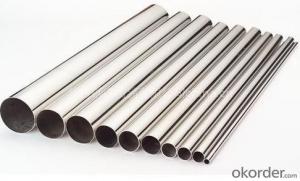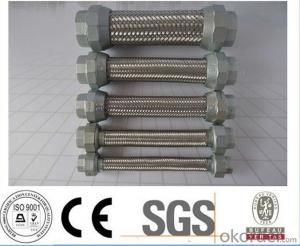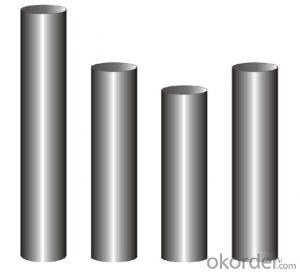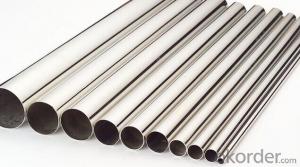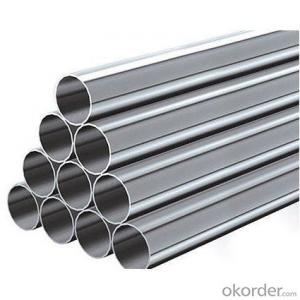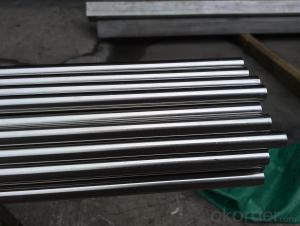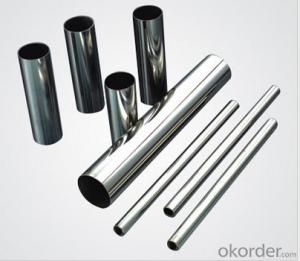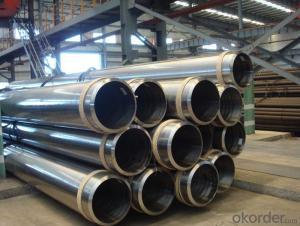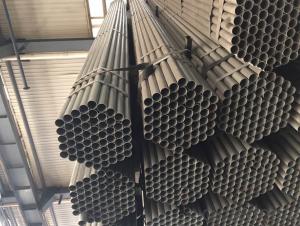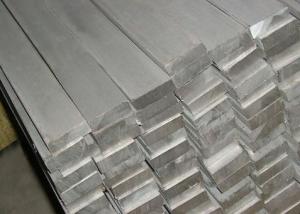Stainless Steel Welded Pipe ASTM A249/A269; GB/T24593
- Loading Port:
- Ningbo
- Payment Terms:
- TT OR LC
- Min Order Qty:
- 25 m.t.
- Supply Capability:
- 5000 m.t./month
OKorder Service Pledge
OKorder Financial Service
You Might Also Like
1、Structure of Stainless Steel Welded Pipe ASTM A249/A269; GB/T24593:
Stainless steel Welded pipe is used in applications that require the pipe to have high anti-corrosive properties. Compared to steel and cast iron pipes, stainless steels are more flexible, durable and have a higher strength. They are very resistant to erosion-corrosion and can be formed and welded into various shapes and sizes. It is easily connected with various other piping systems and materials and is designed to withstand long life cycles.2、Main Features of Stainless Steel Welded Pipe ASTM A249/A269; GB/T24593:
• High manufacturing accuracy
• High strength
• Small inertia resistance
• Good visual effect
•Reasonable price
3、 Stainless Steel Welded Pipe ASTM A249/A269; GB/T24593 images:
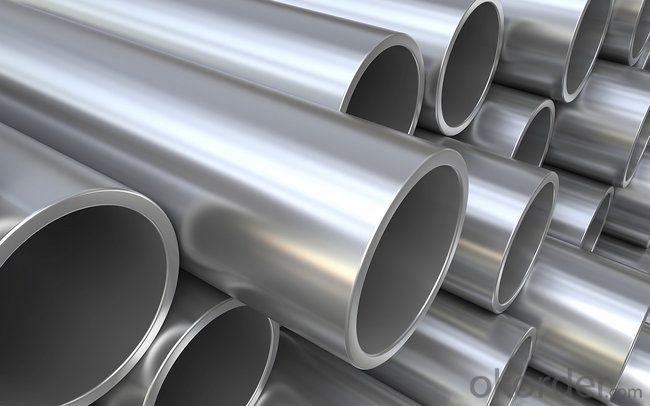

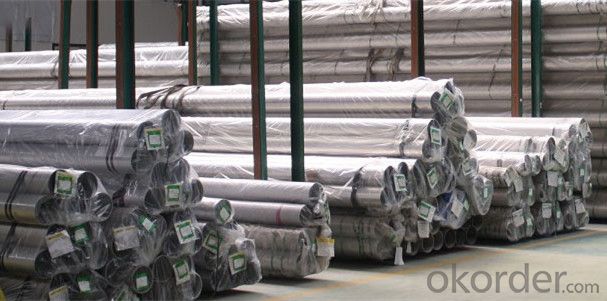
4、 Stainless Steel Welded Pipe ASTM A249/A269; GB/T24593 Specification:
Size:
| DN | OD | WT | ||||
| SCH 5S | SCH 10S | SCH 20S | SCH 40S | |||
| (A) | (B) | mm | mm | mm | mm | mm |
| 350 | 14' | 355.6 | 3.96 | 4.78 | 7.92 | 11.13 |
| 400 | 16' | 406.4 | 4.19 | 4.78 | 7.92 | 12.7 |
| 450 | 18' | 457.2 | 4.19 | 4.78 | 7.92 | 14.27 |
| 500 | 20' | 508.0 | 4.78 | 5.54 | 9.53 | 15.09 |
| 550 | 22' | 558.8 | 4.78 | 5.54 | 9.53 | 15.09 |
| 600 | 24' | 609.6 | 5.54 | 6.35 | 9.53 | 17.48 |
| 650 | 26' | 660.4 | 5.54 | 7.92 | 12.7 | 17.48 |
| 700 | 28' | 711.2 | 5.54 | 7.92 | 12.7 | 17.48 |
| 750 | 30' | 762.0 | 6.35 | 7.92 | 12.7 | 17.48 |
| 800 | 32' | 812.8 | 7.90 | 12.7 | 17.48 | |
| 850 | 34 | 863.6 | 7.92 | 12.7 | 17.48 | |
| 900 | 36' | 914.4 | 7.92 | 12.7 | 19.05 | |
| 1000 | 40' | 1016.0 | 9.53 | |||
| OD(mm) | WT(mm) | |||||||||||||
| 0.5 | 0.6 | 0.7 | 0.8 | 0.9 | 1 | 1.2 | 1.5 | 2 | 2.5 | 3 | 4 | 5 | ||
| 9.5 | ||||||||||||||
| 12 | ||||||||||||||
| 1/2' | 12.7 | |||||||||||||
| 13 | ||||||||||||||
| 14 | ||||||||||||||
| 5/8' | 15.9 | |||||||||||||
| 3/4' | 19.1 | |||||||||||||
| 7/8' | 22.2 | |||||||||||||
| 1' | 25.4 | |||||||||||||
| 1-1/8' | 28.6 | |||||||||||||
| 1-1/4' | 31.8 | |||||||||||||
| 1-1/2' | 38.1 | |||||||||||||
| 40 | ||||||||||||||
| 45 | ||||||||||||||
| 2' | 50.8 | |||||||||||||
| 52 | ||||||||||||||
| 2-1/4' | 57.15 | |||||||||||||
| 2-3/8' | 60.3 | |||||||||||||
| 2-1/2' | 63.5 | |||||||||||||
| 70 | ||||||||||||||
| 3' | 76.2 | |||||||||||||
| 85 | ||||||||||||||
| 3-1/2' | 88.9 | |||||||||||||
| 4' | 101.6 | |||||||||||||
| 4-1/8' | 104.78 | |||||||||||||
| 4-1/4' | 107.95 | |||||||||||||
| 4-1/2' | 114.3 | |||||||||||||
| 5-1/4' | 133.35 | |||||||||||||
| 6-1/4' | 158.75 | |||||||||||||
| 8-5/8' | 219.08 | |||||||||||||
ASTM A249 tolerance:
| OD | WT | Length | |
| <25.40mm | ±0.10mm | ±10.00% | OD<50.8mm +3.0mm -0mm OD≥50.8mm +5.0 -0mm |
| ≥25.4mm~38.1mm | ±0.15mm | ||
| ≥38.1mm~50.8mm | ±0.20mm | ||
| ≥50.8mm~63.5mm | ±0.25mm | ||
| ≥63.5mm~76.2mm | ±0.30mm | ||
| ≥76.2mm~101.6mm | ±0.38mm | ||
| ≥101.6mm~190.5mm | +0.38mm -0.64mm | ||
| ≥190.5mm~228.6mm | +0.38mm -1.14mm | ||
ASTM A269 tolerance:
| OD | WT | Length | |
| <38.1mm | ±0.13mm | OD<12.7mm ±15% OD≥12.7mm ±10% | OD<38.1mm +3.20mm -0mm OD≥38.1mm +4.80 -0mm |
| ≥38.1mm~88.9mm | ±0.25mm | ||
| ≥88.9mm~139.7mm | ±0.38mm | ||
| ≥139.7mm~203.7mm | ±0.76mm | ||
| ≥203.7mm~304.8mm | ±1.01mm | ||
| ≥304.8mm~355.6mm | ±1.26mm | ||
5、FAQ of Stainless Steel Welded Pipe ASTM A249/A269; GB/T24593:
①How is the quality of your products?
Our products are manufactured strictly according to national and internaional standard, and we take a test on every pipe before delivered out. If you want see our quality certifications and all kinds of testing report, please just ask us for it.
Guaranteed: If products’ quality don’t accord to discription as we give or the promise before you place order, we promise 100% refund.
②How about price?
Yes, we are factory and be able to give you lowest price below market one, and we have a policy that “ for saving time and absolutely honest business attitude, we quote as lowest as possible for any customer, and discount can be given according to quantity”,if you like bargain and factory price is not low enough as you think, just don’t waste your time.Please trust the quotation we would give you, it is professional one.
③Why should you chose us?
Chose happens because of quality, then price, We can give you both.Additionally, we can also offer professional products inquiry, products knowledge train(for agents), smooth goods delivery, exellent customer solution proposals.Our service formula: good quality+good price+good service=customer’s trust
SGS test is available, customer inspection before shipping is welcome, third party inspection is no problem.
Any question, pls feel free to contact us !
- Q: Can stainless steel pipes be used for seawater applications?
- Yes, stainless steel pipes can be used for seawater applications. Stainless steel is highly resistant to corrosion and can withstand the harsh conditions of seawater, making it an ideal material for pipes used in marine environments. The chromium content in stainless steel forms a protective oxide layer on the surface of the pipes, preventing corrosion and ensuring durability. Additionally, stainless steel pipes have good strength and can handle high-pressure situations, making them suitable for various seawater applications such as desalination plants, offshore oil rigs, and shipbuilding.
- Q: Can stainless steel pipes be coated with epoxy?
- Stainless steel pipes have the ability to be coated with epoxy, which is frequently utilized in a variety of industries to safeguard and enhance the performance of these pipes. By creating a protective barrier against corrosion, chemical damage, and abrasion, the epoxy coating effectively extends the pipes' lifespan. Moreover, it aids in enhancing the pipes' flow efficiency by minimizing friction and preventing the accumulation of deposits or scaling. Additionally, the application of epoxy coatings to stainless steel pipes allows for aesthetic purposes such as customization and color-coding of different pipe systems. In summary, the utilization of epoxy coatings on stainless steel pipes offers numerous advantages in terms of safeguarding, durability, and functionality.
- Q: Can stainless steel pipes be used in food processing industries?
- Stainless steel pipes find widespread use in the food processing industry. This material possesses remarkable durability and resistance to corrosion, making it capable of enduring the challenging conditions and elevated temperatures frequently encountered in food processing plants. Moreover, its non-reactive nature guarantees that it won't interact with food or affect its flavor, rendering it a secure option for transporting diverse food products. Furthermore, stainless steel pipes facilitate effortless cleaning and maintenance, thus ensuring the fulfillment of hygiene standards within the food processing sector.
- Q: What is the difference between electropolished and passivated stainless steel pipes?
- Both electropolished and passivated stainless steel pipes are utilized as surface treatments in order to enhance the corrosion resistance and aesthetic appearance of stainless steel. Nevertheless, there exist notable distinctions between the two procedures. Electropolishing serves as an electrochemical method which selectively eradicates a minute layer of material from the surface of the stainless steel. This process aids in eliminating impurities, contaminants, and embedded particles, thereby resulting in a sleek and pristine surface. Furthermore, electropolishing enhances the microfinish of the stainless steel, thereby reducing surface roughness and elevating the overall appearance. It also augments the corrosion resistance of stainless steel by fostering the formation of a passive chromium oxide layer on the surface. Conversely, passivation is a chemical process that involves the application of an acid-based solution onto the surface of the stainless steel. This solution assists in eliminating iron contaminants and other foreign substances from the surface, leaving behind a spotless and passive layer of chromium oxide. Passivation serves to enhance the corrosion resistance of stainless steel by promoting the creation of a stable and protective oxide layer. In conclusion, electropolishing represents an electrochemical approach that eradicates a thin layer of material, thereby generating a smooth and pristine surface, whereas passivation constitutes a chemical process that eliminates contaminants and encourages the development of a safeguarding oxide layer. Both procedures contribute to heightening the corrosion resistance and aesthetics of stainless steel pipes, although they differ in the methodologies employed to achieve these outcomes.
- Q: Are stainless steel pipes suitable for high-temperature steam?
- Certainly, stainless steel pipes are well-suited for the transportation of high-temperature steam. Renowned for its exceptional resistance to both heat and corrosion, stainless steel proves to be an optimal choice for applications involving elevated temperatures and steam. The substantial presence of chromium and nickel in stainless steel aids in its ability to endure the corrosive impact of steam, thereby averting oxidation and preserving its structural integrity. Furthermore, stainless steel pipes boast remarkable strength and durability, guaranteeing their capacity to withstand the pressure and strain induced by high-temperature steam. In summary, stainless steel pipes provide a dependable and enduring solution for the conveyance of high-temperature steam across various industries, including power generation, chemical processing, and oil and gas.
- Q: What is the difference between seamless and hot-expanded stainless steel pipes?
- Seamless and hot-expanded stainless steel pipes are two different types of manufacturing processes for producing stainless steel pipes. Seamless stainless steel pipes are made by piercing a solid billet of stainless steel and then rolling it into a pipe shape. This process does not involve any welding or joining of separate pieces, resulting in a seamless pipe. Seamless pipes are known for their uniformity and strength, as there are no weak points or potential leak paths in the pipe. They are generally more expensive to produce and are used in applications where high corrosion resistance and pressure handling are required, such as in the oil and gas industry or in high-pressure boilers. On the other hand, hot-expanded stainless steel pipes are made by heating a stainless steel pipe and expanding it to a larger diameter using a mandrel inside the pipe. This process creates a larger diameter pipe with a uniform wall thickness. Hot expansion is typically used to produce larger diameter pipes that are required for specific applications. The hot expansion process can improve the mechanical properties of the pipe, such as increased tensile strength and improved resistance to corrosion. These pipes are commonly used in industries such as petrochemical, power generation, and construction. In summary, the main difference between seamless and hot-expanded stainless steel pipes lies in their manufacturing processes and the resulting properties of the pipes. Seamless pipes are made by rolling a solid billet, while hot-expanded pipes are created by heating and expanding an existing pipe. Seamless pipes are known for their strength and uniformity, while hot-expanded pipes are often used for larger diameter applications and can have improved mechanical properties.
- Q: What is the tensile strength of stainless steel pipes?
- The tensile strength of stainless steel pipes can vary depending on the specific grade and composition of the steel. However, stainless steel is known for its high tensile strength, making it a popular choice for various applications that require strong and durable pipes. On average, stainless steel pipes have a tensile strength ranging from 500 to 1500 megapascals (MPa). This high tensile strength allows stainless steel pipes to withstand significant pressure and stress, making them suitable for use in industries such as construction, oil and gas, chemical processing, and automotive manufacturing. It is important to note that the exact tensile strength of stainless steel pipes can be influenced by factors such as the manufacturing process, heat treatment, and any additional alloying elements present in the steel. Therefore, it is essential to consult the specific technical specifications or standards for the particular grade of stainless steel pipes in order to determine their exact tensile strength.
- Q: Are stainless steel pipes suitable for brewery applications?
- Yes, stainless steel pipes are highly suitable for brewery applications. Stainless steel is a preferred material in the brewing industry due to its excellent corrosion resistance, durability, and hygienic properties. These pipes can withstand the harsh conditions of a brewery environment, including exposure to hot liquids and cleaning chemicals, without corroding or contaminating the beer. Stainless steel pipes also have a smooth surface, which helps prevent the buildup of bacteria and other contaminants, ensuring a high level of cleanliness and quality in the brewing process. Additionally, stainless steel is easy to clean and maintain, making it a practical choice for breweries. Overall, stainless steel pipes are a reliable and efficient option for brewery applications.
- Q: Can stainless steel pipes be used for nuclear waste storage?
- Indeed, nuclear waste storage can make use of stainless steel pipes. Due to its exceptional resistance to corrosion, stainless steel proves to be an optimal material for the containment and transportation of dangerous substances like nuclear waste. The durability, strength, and capability to endure extreme temperatures of stainless steel render it apt for the prolonged storage of radioactive waste. Furthermore, stainless steel remains non-reactive and prevents the release of harmful substances, thus assuring the preservation of the stored waste's integrity. Nonetheless, it remains crucial to verify that the stainless steel utilized adheres to the specific requirements and standards established for nuclear waste storage to guarantee utmost safety and confinement.
- Q: Can stainless steel pipes be used for underground water supply lines?
- Indeed, underground water supply lines can utilize stainless steel pipes. Due to its exceptional resistance to corrosion, stainless steel proves to be an excellent option for subterranean applications where the pipes may encounter soil, moisture, and other corrosive elements. Moreover, its impressive strength and durability characteristics guarantee that the pipes can endure the pressure and strain associated with burial. Additionally, stainless steel serves as a hygienic material that does not release any hazardous substances into the water supply, rendering it safe for drinking purposes. In conclusion, stainless steel pipes present themselves as a dependable and enduring choice for underground water supply lines.
Send your message to us
Stainless Steel Welded Pipe ASTM A249/A269; GB/T24593
- Loading Port:
- Ningbo
- Payment Terms:
- TT OR LC
- Min Order Qty:
- 25 m.t.
- Supply Capability:
- 5000 m.t./month
OKorder Service Pledge
OKorder Financial Service
Similar products
Hot products
Hot Searches
Related keywords
